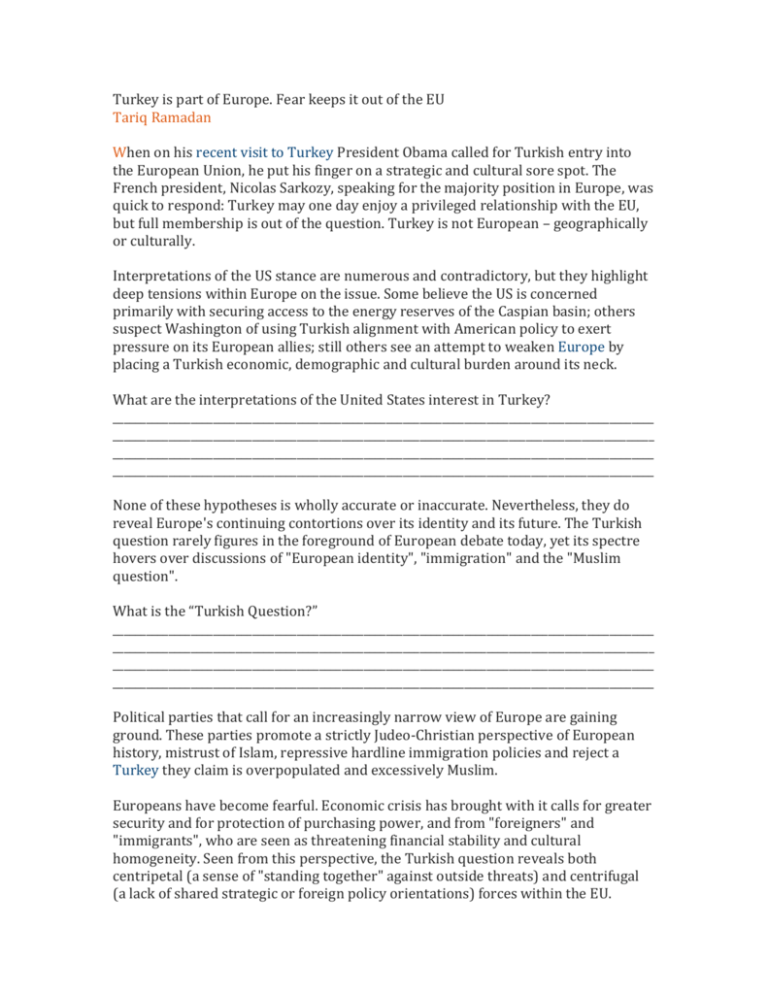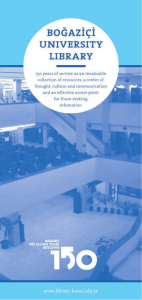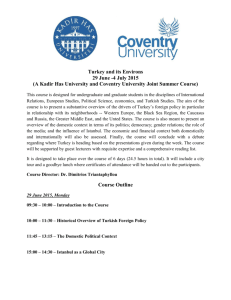Turkey is part of Europe - Mounds Park Academy Blogs
advertisement

Turkey is part of Europe. Fear keeps it out of the EU Tariq Ramadan Sarkozy's argument won't wash. This great nation, a crucial link with the be When on his recent visit to Turkey President Obama called for Turkish entry into the European Union, he put his finger on a strategic and cultural sore spot. The French president, Nicolas Sarkozy, speaking for the majority position in Europe, was quick to respond: Turkey may one day enjoy a privileged relationship with the EU, but full membership is out of the question. Turkey is not European – geographically or culturally. Interpretations of the US stance are numerous and contradictory, but they highlight deep tensions within Europe on the issue. Some believe the US is concerned primarily with securing access to the energy reserves of the Caspian basin; others suspect Washington of using Turkish alignment with American policy to exert pressure on its European allies; still others see an attempt to weaken Europe by placing a Turkish economic, demographic and cultural burden around its neck. What are the interpretations of the United States interest in Turkey? _________________________________________________________________________________________________ _________________________________________________________________________________________________ _________________________________________________________________________________________________ _________________________________________________________________________________________________ None of these hypotheses is wholly accurate or inaccurate. Nevertheless, they do reveal Europe's continuing contortions over its identity and its future. The Turkish question rarely figures in the foreground of European debate today, yet its spectre hovers over discussions of "European identity", "immigration" and the "Muslim question". What is the “Turkish Question?” _________________________________________________________________________________________________ _________________________________________________________________________________________________ _________________________________________________________________________________________________ _________________________________________________________________________________________________ Political parties that call for an increasingly narrow view of Europe are gaining ground. These parties promote a strictly Judeo-Christian perspective of European history, mistrust of Islam, repressive hardline immigration policies and reject a Turkey they claim is overpopulated and excessively Muslim. Europeans have become fearful. Economic crisis has brought with it calls for greater security and for protection of purchasing power, and from "foreigners" and "immigrants", who are seen as threatening financial stability and cultural homogeneity. Seen from this perspective, the Turkish question reveals both centripetal (a sense of "standing together" against outside threats) and centrifugal (a lack of shared strategic or foreign policy orientations) forces within the EU. What is the “increasingly narrow view of Europe?” _________________________________________________________________________________________________ _________________________________________________________________________________________________ _________________________________________________________________________________________________ _________________________________________________________________________________________________ The arguments that locate Turkey outside European history and geography cannot withstand analysis. For more than four centuries the Ottoman Empire shared and shaped the political and strategic future of the continent. Twice the Ottomans laid siege to Vienna. During the late 19th and early 20th century, it became the "sick man of Europe". Even today, Turkey's historical and economic influence continues to be substantial. Why does the author say “the arguments that locate Turkey outside European history and geography cannot withstand analysis?” _________________________________________________________________________________________________ _________________________________________________________________________________________________ _________________________________________________________________________________________________ _________________________________________________________________________________________________ No one is likely to be fooled by attempts to redraw the geographical boundaries of Europe for ideological or political purposes. If we were to apply the same criteria across the board, Cyprus would not be part of Europe. Such artificial distinctions ignore history, just as they ignore the realities of European society itself, where national origins, memories and cultures have long met and blended. Approximately 40% of Turkey's population is of European origin; millions of Turks have already acquired the nationality of a European country. We must look elsewhere for the real issues, and we must look them in the eye. Instead of being obsessed by the question of culture and religion, European leaders would be better advised to develop a forward-looking strategic vision. Given its close ties with Iran, Syria, Iraq and central Asia, Turkey simply cannot be ignored. Its economic and military clout should be integrated into a European policy based on good-neighbourly relations and stability in Asia and the Middle East. On two recent occasions the Turkish government has refused to bow to Washington, demonstrating a distinct capacity for independent action. Europe can hardly fault the US for its unilateral behaviour while failing to develop an autonomous foreign policy of its own. Where there should be a unified European voice, there is a discordant chorus. The US, China and India have no reason to fear European power. Divided, lacking a common policy, Europe succeeds only in working against itself. Meanwhile, commercial ties between Turkey and the European countries have continued to expand. Between 1990 and 2003, Turkish imports from Europe grew threefold, while exports quadrupled. Better trade management within the framework of an EU-wide economic policy should make these ties stronger and more competitive. The countries of Europe are facing an acute, long-term manpower shortage. Writing in internal EU publications, some specialists now argue the labour market will require an additional 15 million workers in the next 20 years. Europe needs immigration. Instead of adopting restrictive immigration policies that would criminalise both undocumented and legal immigrants, the EU should be moving toward realistic and responsible regulation. In this light Turkey, with its human resources, would prove a powerful ally. Why would Turkey make a good ally for the Europeans? _________________________________________________________________________________________________ _________________________________________________________________________________________________ _________________________________________________________________________________________________ _________________________________________________________________________________________________ It is time for the countries of Europe to overcome their fear of Islam; time for them to stop turning Turkish EU membership into a cultural battleground. The only criteria to membership should be those of Copenhagen (1993) – and a European commission report (2004) mentioned that Turkey is very close to satisfying them. European politicians are ready to ignore their countries' long-term socioeconomic needs in order to respond to the short-term religious and cultural fears of their constituencies. Millions of women and men are already European and Muslim; Turkish EU membership would be nothing new, and present no dangers. Islam is, de facto, a European religion; culturally, politically and economically, Turkey forms an integral part of its future. We need courageous European politicians who will develop a new vision of TurkishEU relations, who will remind their citizens that Turkey, by virtue of its economic power, geography, history and natural position as go-between with the "Muslim world", is a major asset for Europe and for its future. Instead of waiting until historical necessity forces the EU to incorporate Turkey, European statesmen should be working together to develop a clear, reasonable policy leading to Turkish membership – one that would respect political principles and recognise cultural and religious diversity. Welcoming Turkey into the EU would mean Europe would have to reconcile itself with its own principles: the principles it has all too often betrayed in practice. Any additional questions you have about the document: _________________________________________________________________________________________________ _________________________________________________________________________________________________ _________________________________________________________________________________________________ _________________________________________________________________________________________________ _________________________________________________________________________________________________ _________________________________________________________________________________________________ _________________________________________________________________________________________________ _________________________________________________________________________________________________








